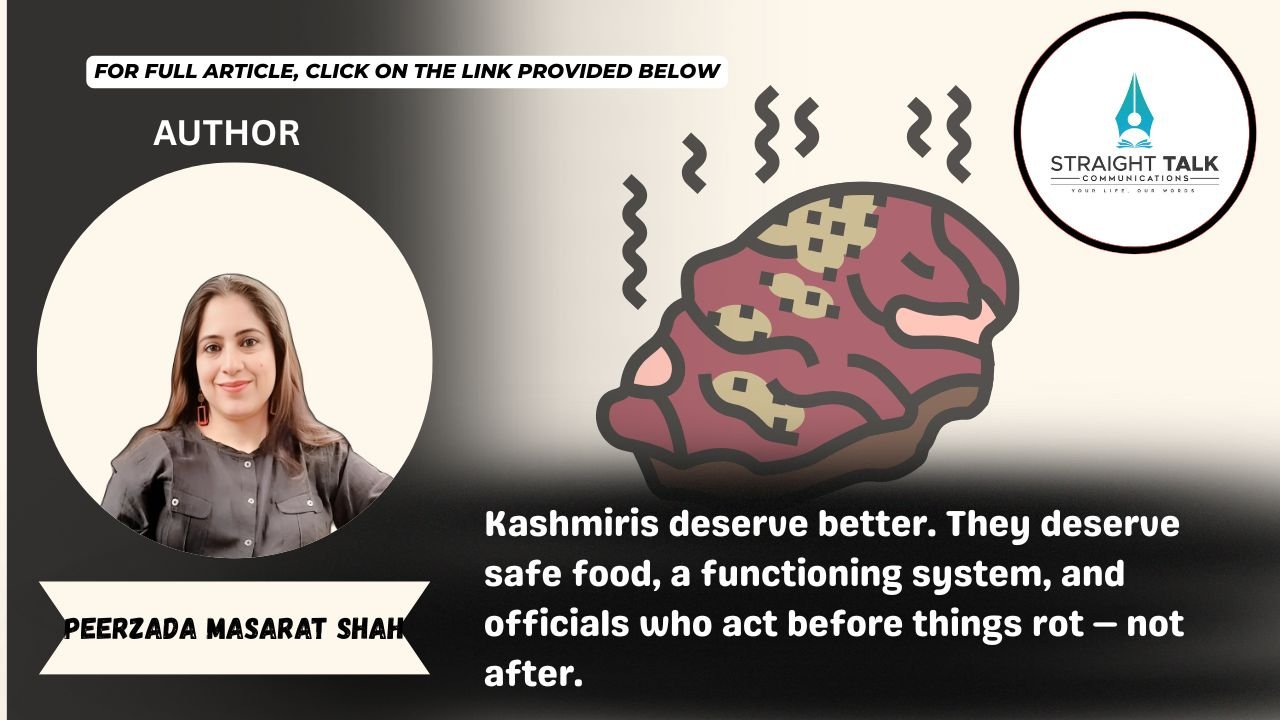From Freezer to Fiasco: Kashmir’s Meat Gets a Sunbath

Kashmiris deserve better. They deserve safe food, a functioning system, and officials who act before things rot — not after.
Peerzada Masarat Shah
In a place where food is woven into the very fabric of identity and culture, Kashmir has just been served a horrifying reality check — 1,200 kilograms of decomposed meat, seized in Zakura on the outskirts of Srinagar. What was meant for human consumption turned out to be a festering heap of rot, exposing not just one rogue godown but a system that has, quite literally, gone bad.
This shocking seizure isn’t just about spoiled meat; it’s a damning reflection of a supply network running on shortcuts, blind eyes, and silent approvals. The cold chain — the backbone of any safe meat transportation system — seems to be treated here as a mere suggestion. And in Kashmir’s searing summer heat, that omission is more than negligence — it’s public endangerment.
A senior official from the Food Safety Department, in what can only be described as a delayed epiphany, explained that the meat decomposed because it wasn’t stored at the right temperature. Truly groundbreaking. “Improper storage, poor packaging, and lack of refrigeration caused the meat to rot,” he said, as if this weren’t obvious to anyone who’s ever left chicken out for more than ten minutes.
The meat was unlabelled, untraceable, and yet was well on its way to local plates — most likely through budget eateries and street vendors that cater to Kashmir’s working class. While the privileged dined on hygienic cuts, the less fortunate were nearly fed rancid carcasses disguised as ‘affordable meat.’
Let’s be clear: this isn’t just bad meat. This is a bad system. Officials cautiously avoid the word nexus, but when 1,200 kilos of rotting meat quietly moves through the supply chain, what else are we looking at? This isn’t one man’s slip-up. It’s the outcome of years of bureaucratic laziness, zero accountability, and a total lack of food safety ethics.
Worse still, the rot isn’t confined to Srinagar. Authorities admit that such meat could be making its way into rural and semi-urban markets, where inspection is often a forgotten formality. If the situation in the state capital is this dire, what might be happening in towns without media scrutiny?
As for the man in charge of the warehouse where the spoiled meat was found? He claims ignorance — the ever-convenient “I didn’t know it was there” defense. Apparently, 1.2 tonnes of rotting meat just walked in, unpacked itself, and settled in without anyone noticing. His statement has been recorded, investigations are ongoing, and if history is any guide, they’ll soon be ongoing their way into oblivion.
Officials have now promised intensified checks, surprise raids, and increased surveillance. Cue applause — or don’t. Because we’ve all heard this script before. Every food scandal is followed by a flurry of action that dies quietly as soon as public attention shifts.
Perhaps the darkest twist in this saga is the possibility that some restaurants and dhabas offering suspiciously cheap food are managing their margins by serving substandard or even decomposed meat. It’s a chilling thought: that economic desperation is being exploited in the ugliest way possible — by feeding people poison priced as a bargain.
And what’s the department’s advice to consumers? “Stay alert. Report anything odd. Call our helpline.” Admirable — but also laughably hollow. Are customers now supposed to carry thermometers and lab kits while buying mutton? Is it really the public’s job to stop the rot?
Let’s not insult people’s intelligence. Food safety isn’t a shared burden. It’s a government responsibility. When that system breaks down, you don’t shift the blame onto the people who trusted it.
The idea that Kashmir’s proud food legacy — especially the revered wazwan — is being undermined by negligence and greed is heartbreaking. Wazwan isn’t just a meal. It’s an art, a heritage, a symbol of Kashmiri pride. If the very foundation of that culture is being compromised by an indifferent cold chain and unscrupulous traders, it’s not just meat that’s decaying — it’s trust.
The Food Safety Department has shared its toll-free number (104) for complaints. That’s a start. But is a single phone line enough to absorb the collective anger of an entire region?
Maybe it’s time for new meat labels — something more honest, like:
“May contain traces of expired meat, poor decisions, and institutional failure.”
Kashmiris deserve better. They deserve safe food, a functioning system, and officials who act before things rot — not after. Until then, eat cautiously — and perhaps, carry your own cold chain.







